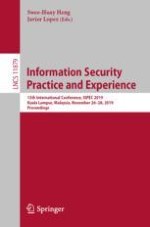2019 | OriginalPaper | Buchkapitel
Designing a Code Vulnerability Meta-scanner
verfasst von : Raounak Benabidallah, Salah Sadou, Brendan Le Trionnaire, Isabelle Borne
Erschienen in: Information Security Practice and Experience
Aktivieren Sie unsere intelligente Suche, um passende Fachinhalte oder Patente zu finden.
Wählen Sie Textabschnitte aus um mit Künstlicher Intelligenz passenden Patente zu finden. powered by
Markieren Sie Textabschnitte, um KI-gestützt weitere passende Inhalte zu finden. powered by
